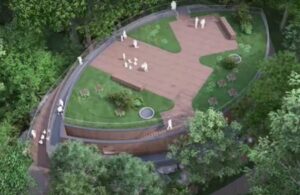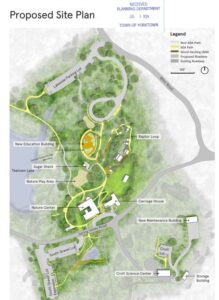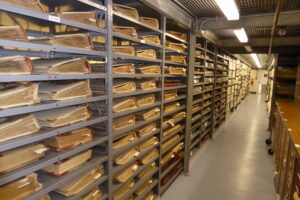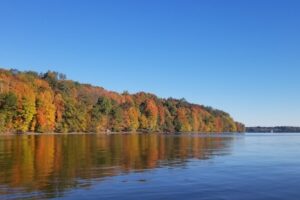Teatown Lake Reservation has proposed a multimillion-dollar campus renovation that includes adding a new education center, refurbishing the Nature Center, relocating parking areas and making trails more accessible.
The 1,000-acre nature preserve, which falls within the towns of Cortlandt, New Castle and Yorktown, is Westchester’s largest community funded nature preserve, according to Managing Director Alan Sorkin.
“Our mission continues to inspire lifelong environmental stewardship in the community,” Sorkin said during an Oct. 21 public hearing before the Yorktown Planning Board. The renovations are intended to enhance Teatown’s impact but not its capacity, according to the nonprofit.
Proposal highlights
- A leaf-shaped 5,500-square-foot one-story education center featuring a green roof, outdoor learning spaces and geothermal heating/cooling. Three classrooms would accommodate a total of 75 students for class visits and summer programs. A storage barn would be relocated to create space for the new building.
- Nature Center renovation includes adding a new dormer, turning the attic into administrative offices. Welcome gallery named for philanthropist David Swope added on the main level. New Habitat and Stewardship galleries.
- Parking lot at the Nature Center on Spring Valley Road would be replaced by landscaping. Parking spaces moved across Spring Valley Road to an expanded lot.
- Buses dropping off students and campers for the new education center would use a dedicated area off Blinn Road rather than at the busy Spring Valley Road entrance.
- Trails made more accessible for disabled visitors and strollers. Accessible trail added from Blinn Road lot to Teatown lake.
Estimated costs for the renovations have not been announced, but during a June 20 informational session, Executive Director Kevin Carter said Teatown had raised $21 million in gifts and pledges and was continuing to seek funding.

“We’re certainly not going to begin the public phase of the campaign until we have the assurance of convergence of the fundraising with the plans and also the town approval,” Carter said during the June presentation.
Email and phone messages left for Sorkin and Carter seeking additional details were not immediately returned.
The renovation is intended to strengthen Teatown’s commitment to environmental education; modernize aging infrastructure including improving the campus’ sustainability; and creating a safer and more accessible campus.
The organization manages 15 miles of hiking trails, a two-acre island refuge for over 230 species of native wildflowers, year-round programming, wildlife exhibits, and science day camps in the summer and school breaks.
Teatown has applied for approval for a site plan and special use, wetland, stormwater pollution prevention and tree permits. Decisions on those requests would be granted at the same time, according to Yorktown Town Planner Robyn Steinberg.
Representatives from Teatown were revising plans to address concerns raised by Yorktown’s Fire Prevention Bureau, Steinberg said in November. The soonest a decision on the application could be made by Yorktown’s Planning Board would be in December.
Approvals are also required from the Westchester County Board of Health, state Department of Environmental Conservation, and New York City Department of Environmental Protection.
Teatown had a year-end net of $3,606,196 in 2023, according to its annual report.
Concerns raised

No one from the public spoke during the Planning Board’s October hearing, but a letter from Geoff Thompson, a Teatown honorary board member, past president and past board chair, raised concerns about the project.
Thompson, whose Blinn Road property borders the campus, sent a letter to the Planning Board stating he didn’t object to the overall concept of the plan but said it would “undeniably result in a major expansion of the institutional footprint.”
The proposed access for buses on Blinn Road “means it will be far more of a street than a typical residential driveway,” wrote Thompson, who has lived next door to Teatown for 44 years.
He called for restrictions on the number of buses per day and on night lighting; inclusion of evergreen screening; and preservation of Blinn Road’s rural appearance.
Construction could complicate installation of a culvert/tunnel under Blinn Road that will be used to dredge muddy water from Teatown Lake, he pointed out.
Teatown history
The preserve grew out of a 194-acre donation from the heirs of G.E. Chairman Gerard Swope to the Brooklyn Botanic Garden in 1963. Teatown was incorporated as a separate entity in 1971, and the partnership with the Brooklyn Botanic Garden was eventually dissolved.
The name “Teatown” dates back to 1776 when tea was scarce due to British taxation. A man named John Arthur moved to the area with a chest full of tea that he planned to sell at a huge profit. His plot was discovered and he was forced to sell the tea at a fair price.






